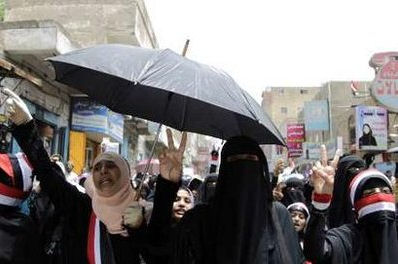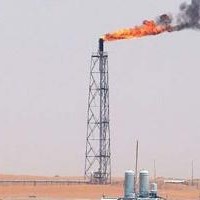![]()
Tue, June 07, 2011 | DanielPipes.org | By Daniel Pipes

Women shout slogans during a demonstration demanding the ouster of Yemen's President Ali Abdullah Saleh in the southern city of Taiz June 15, 2011. (REUTERS/Khaled Abdullah)
The Emptying of Yemen
This article was first published in The Washington Times and DanielPipes.org.
For the first time in its exceedingly long history, Yemen now threatens the outside world. It does so in two principal ways.
First, even before the current political upheaval began there on January 15, violence emanating out of Yemen impinged on Westerners. As President Ali Abdullah Saleh’s weak government controlled only a small part of the country, violence had emerged both near to Yemen (such as attacks on American and French ships) and distant from it (Anwar al-Awlaki’s incitement to terrorism in Texas, Michigan, and New York). With Mr. Saleh’s apparent abdication on June 4, when he traveled to Saudi Arabia for medical treatment, the central government’s writ will further diminish, Yemen is set to become an even greater exporter of violence.
But it’s the second danger that staggers the mind: an unprecedented emptying out of Yemen, with millions of unskilled and uninvited refugees, first in the Middle East, then in the West, many of them Islamists, demanding economic asylum.
The problem begins with an increasingly cataclysmic water shortfall. Gerhard Lichtenthäler, a specialist this topic, wrote in 2010 how, in many of the country’s mountainous areas,
“available drinking water, usually drawn from a spring or a cistern, is down to less than one quart per person per day. Its aquifers are being mined at such a rate that groundwater levels have been falling by 10 to 20 feet annually, threatening agriculture and leaving major cities without adequate safe drinking water. Sanaa could be the first capital city in the world to run dry.”
And not just Sanaa: as a London Times headline put it, Yemen “could become first nation to run out of water.” Nothing this extreme has happened in modern times, although similar patterns of drought have developed in Syria and Iraq.
Scarce food resources, columnist David Goldman points out, threaten to leave large numbers of Middle Easterners hungry and a third of Yemenis faced chronic hunger even before the unrest. That number is growing quickly.
The prospect of economic implosion looms larger by the day. Oil supplies are reduced to the point that “Trucks and buses at petrol stations queue for hours, while water supply shortages and power blackouts are a daily norm.” Productive activity is proportionately in decline.
If water and food were not worrisome enough, Yemen has one of the highest birthrates in the world, exacerbating the resource problem. With an average of 6.5 children per woman, almost 1 in 6 women is pregnant at any given time. Today’s population of 24 million is predicted to double in about 30 years.
Politics exacerbate the problem. Assuming Mr. Saleh’s rule is history (the Saudis may not let him leave, too many domestic opponents have risen against him), his successor will have difficulty ruling even the meager portion of the country that he controlled.
Too many factions with contrary aims are competing for power — Mr. Saleh’s forces, Houthi rebels in the north, secessionists in the south, Al-Qaeda-style forces, a youth movement, the military, leading tribes, and the Ahmar family — for them to coalesce into a neat binary conflict. In a country governed by a “tribal system masquerading as a military autocracy,” anarchy along Somali or Afghan lines looks more probable than civil war.
Yemeni Islamists range from members of the Islah Party, which competes in parliamentary elections, to the Houthi rebels fighting Saudi forces, to Al-Qaeda in the Arabian Peninsula. Their growing power boosts the Iranian-backed “resistance bloc” of states and organizations. If Shi’ites prevail over Sunnis in Yemen, Tehran will gain all the more.
In combination, these several crises — ecological, economic, political, ideological — could prompt a mass, unprecedented, and tragic exodus out of Yemen, leading to an epic anti-Yemeni backlash.
On a personal note: I was fascinated by Yemen on a visit as a student in 1972. A land so difficult of access that colonial powers only lapped at its edges, it managed to keep its customs, including a spectacular style of architecture and a distinctive culture of dagger-wearing men and most adults chewing qat.
Can the outside world prevent catastrophe? No. Yemen’s terrain, culture, and politics all render a military intervention untenable; and, at this time of Western deficits and Saudi dread, no one will take responsibility for its collapsing economy. Nor will states volunteer to take in millions of needy refugees.
In this darkest hour, Yemenis are on their own.
Mr. Pipes is president of the Middle East Forum and Taube distinguished visiting fellow at the Hoover Institution of Stanford University.



 RSS
RSS









Latest Comments
Hello Mike, Thank you for your positive feedback to the article. I felt there wasn’t too much critical analysis of ...
Thanks for this considered and well constructed article. A follow up article on the manner in which the editorial contro...
THE CLUELESSNESS OF CLAIMING THAT OBAMA'S MIDDLE EAST POLICIES WERE A FAILURE CANNOT BE FURTHER FROM THE TRUTH, WHAT THE...
As long as Obama is the president of the usa do not trust the us government......
Thank you for an good read....